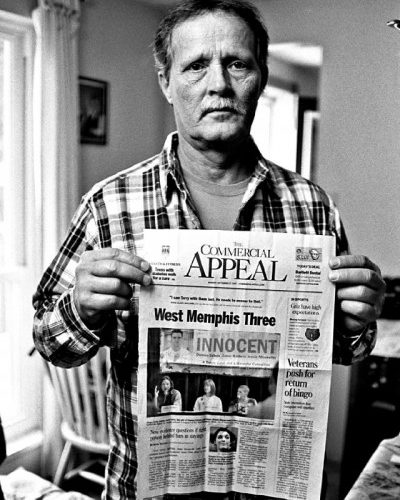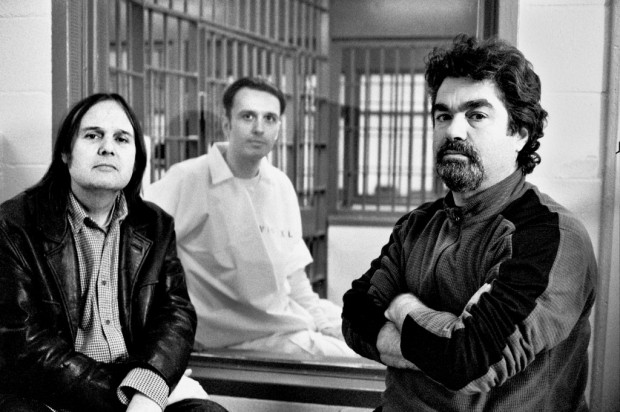You can find Paradise Lost 3: Purgatory at the rarefied juncture where reality and art meet, with each pulling the other to form something greater than simply reflecting off the other. Without the other films in this series, this story would have been over long ago. Without a grave miscarriage of justice, these films wouldn’t have to be made. From this we get a great film made under the worst circumstances.
The film is the third in a trilogy that followed the trial and 1993 conviction of three teens — Jason Baldwin, Damien Echols, and Jessie Misskelley — for the gruesome murders of three young boys, whose bodies were found near the Robin Hood Hills area of West Memphis, Arkansas. This truly shocking and awful event is compounded when it’s revealed that all of the evidence that put Baldwin and Misskelley in prison for life and Echols on death row was based on hearsay and rumors that these outsiders were a part of a devil-worshiping cult and murdered the boys in some bizarre sacrifice to Satan. There was no evidence that put them at the scene of the crime, with the only “smoking gun” being a factually-incorrect admission of guilt following a twelve hour interrogation. They have languished in prison for eighteen years.
This film, capably directed Joe Beringer and Bruce Sinofsky in keeping with the rest of the films, feels more like a capstone than a continuation on the series. It opens with a fully-comprehensive run-down of the murders and the story up until the present, featuring the extremely graphic and disturbing video filmed by the investigators when they find the children’s bodies, who look more like mannequins than anything that could have been organic. This use of the film making edict “show, don’t tell” helps the audience realize exactly how terrible this act was that has set off this legal and moral odyssey.
Even though injustice is a clear theme throughout this film and its predecessors, the real focus of this film is on the cruel nature of time. Beyond bringing in those viewers who are not aware of the previous two films (all produced by HBO, with this film premiering on the station this January), it also establishes a baseline for just how long this process has dragged on for. We first see the convicts when they were mere boys in their late teens, fresh-faced and (quite literally) innocent, captured on scratchy 16mm film. When we catch up with them years later in crystal-clear HD video, we see these middle aged men: Misskelley resembles a mechanic, Baldwin a middle-manager at a local bank, and Echols the smart, relate-able English teacher who should be doing more with his talents. Sadly, they have even been robbed of leading even the unfulfilling lives they’ve physically grown into. Instead they sit and wait for death or release, whichever comes first.
It’s also used as a reminder of how long people have carried the torch for this case. You’ll notice Echols’ wife, Lorri Davis, mention how sure she is that they will soon be freed. Soon after, the time stamp reading “2005” appears on screen. Watching clips of local news footage that explain they’re up for another appeal with the tease, “could it finally be time for the West Memphis 3 to be freed?” as “1999” is superimposed on the lower-left hand corner. Just as the film needs to reinforce the effect of the murders on the town and surrounding area, it reminds us, over and over and over again, just how excruciatingly long this ordeal was for everyone on either side of the prison walls.
Time wasn’t all bad for the men, however. The case slowly grew in popularity, thanks in no small part to the previous two Paradise Lost films, and made the West Memphis Three not just a cause to rally behind but a group of folk heroes who deserved their justice. Through donations that ran the gamut from common folk to Eddie Vedder, a top-notch legal team was assembled to overturn this flawed case once and for all. The film chronicles this latest attempt and, in doing so, reveals even more damning facts, including jury tampering, falsified testimony, and a shocking lack of procedural work by the police department at the time of the investigation.
By the time the hard-nosed judge David Burnett defends the “expert” testimony from someone who gained their PhD in the occult from a mail-in university by saying “even someone with a third-grade education can be an expert in something” it’s hard to not take this as a Will Ferrell-style comedy. The circumstances are so outrageous in light of the dire consequences that it’s almost hard to imagine that someone isn’t pulling your leg. There are a few instances in this film (especially in light of the previous iterations) where you can’t help but laugh; it’s much easier than weeping.
In a further melding of life and art, this film was in its final sound mix, looking to air on HBO just before the Three had an appeal date in court, when they received a call to head down to Arkansas. The protagonists were freed but only through a completely muddled process where redemption was taken out of the equation. Each defendant was freed after they offered an “Alford” plea, which allows them to plead “guilty” but still maintain their innocence, and are sentenced to the time they have already served. It was a move justified rather simply: the state of Arkansas didn’t want to be sued for wrongful incarceration. Justice may be blind, but it always has an eye on its checkbook.
For a film so intrinsically linked with reality, it’s hard to separate it as a film, but please indulge me. In thematic terms, this is an ending that completely fits in with everything that has come before it. Here is yet another miscarriage of justice, once again pushed further along by a set of circumstances that have little to do with the men who were wrongfully imprisoned. It is a variation on a theme that most fictional narrative trilogies have trouble coming to terms with. The entirety of the trilogy is clean and simple in its vision and direction.
There are times where critics blast movies for being too fantastical, with elements that would never happen in the real world. Considering our court system has stolen a combined 54 years from the very populace it is supposed to protect while further failing us by making no attempt at this time to press forward to find the real killer(s), what I wouldn’t give to have this film fall into that category. Alas, it’s all too real and all too possible to occur again. And when it does, one hopes that three films won’t be needed to save a life.
Paradise Lost 3: Purgatory is currently playing at the New York Film Festival.


